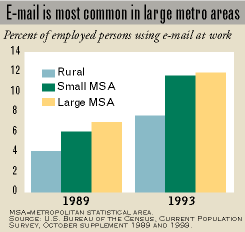Perspective on Cities and Communications Technology 
Is information technology making cities weaker or stronger? Cities and communications technology offer much the same thing. They facilitate human interactions (planned and unplanned) and the exchange of ideas and information. The rapid spread and falling cost of communications technology thus may erode or enhance the productive advantage that cities give workers and firms.
Communications technology would be a substitute for cities if it could deliver the myriad interactions that cities provide without the pollution, traffic congestion, and high urban rents. If it can, firms and workers should be moving to the country.
But communications technology may actually encourage more face-to-face interactions, as Jess Gaspar and Ed Glaeser point out in a recent NBER working paper. If so, communications technology would complement urban economies.
Whether communications technology and cities are substitutes or complements is ultimately an empirical question. My analysis of data from the Current Population Survey, however, reveals two somewhat contradictory facts.
First, e-mail usage is most common in the largest cities, even after controlling for education levels. Were information technology and cities strong substitutes, one might have expected e-mail to arise first in rural areas, where the return to its use would be greatest. Some rural industries, such as forestry, pipe lines, and natural gas extraction, have embraced communications technology. But that e-mail usage has increased most rapidly in urban industries suggests that communications technology and cities are complements.
Second, industries using information technology (as measured by the fraction of employees using e-mail ) have shifted employment from large to small cities, but not to rural areas. This is most apparent in industries such as computer and data processing, insurance, commercial research and development, and communications equipment, all of which saw considerable shifts in employment shares away from the largest cities from 1985 to 1993. This suggests that information technology and cities are substitutes, though not enough to raise employment shares in rural areas.
 How can these findings be resolved? The answer may lie in the reasons cities raise productivity in the first place -- they facilitate the exchange of ideas and information. One would expect any new product, even one that threatens this very advantage of cities, to be disseminated first and most quickly in cities. One does not discover e-mail on e-mail One needs a preexisting medium, such as print or face-to-face interaction, to learn about the latest communications technology advances.
How can these findings be resolved? The answer may lie in the reasons cities raise productivity in the first place -- they facilitate the exchange of ideas and information. One would expect any new product, even one that threatens this very advantage of cities, to be disseminated first and most quickly in cities. One does not discover e-mail on e-mail One needs a preexisting medium, such as print or face-to-face interaction, to learn about the latest communications technology advances.
This initial complementarity, however, may already have been replaced by a more enduring substitutability. If trends continue, the spread of communications technology should shift employment from larger to smaller metropolitan areas. Cities are not becoming obsolete. But because of technology, economic activity may become less concentrated in a handful of large cities than it is today.
-- Jed Kolko studies economics at Harvard.

 About the Authors
About the Authors
John Campbell



